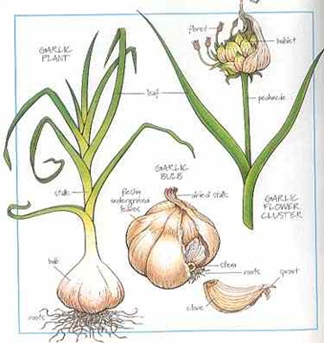Much as I love Folk Tales I love Garlic. The sound and smell of frying garlic is my favorite memory from my mother's kitchen. Every region has it own version of how the Garlic came into being and how it was used throughout history.
During the reign of King Tut, fifteen pounds of garlic could buy you a healthy slave. Even when King Tut's tomb was excavated, there were bulbs of garlic found scattered throughout the rooms.
The Koreans, ate pickled garlic before passing through a mountain path, believing that tigers disliked it.
Roman soldiers ate garlic to inspire them and give them courage. They planted fields of garlic in the countries they conquered, believing that courage was transferred to the battlefield.
The following Philippine Folk Tale narrates how garlic came into being.
The First Garlic
There once lived a beautiful maiden whose mother arranged to be married to the son of one of the richest datus in the land. She was so lovely that a rival suitor murdered her fiance. That rival was, in turn, killed by the dead fiance's loyal slave. As news of the double-deaths spread, the young maiden runs up a sacred mountain and implores Bathala (their God) to take her away so that her beautiful face will no longer cause any future killings.
She gets zapped by lightning.
Her mother buries her and grieves, watering her grave with tears.
One day, the mother sees some grass-like plants sprouting on top of her dead daughter's graves. Thinking it was some useless weed, she pulls it out and sees seeds that look like her dead daughter's teeth.
She hears a supernatural voice boom: "Those are your daughter's teeth."
She gives thanks, knowing this is Bathala's way of giving her something that will remind her of her daughter. She plants the seeds all over her land to spread the memory of her daughter, and that's how the garlic plant began.
References:
http://folktales.webmanila.com/folktales/plants/?garlic
http://americanfolklore.net/folklore/2010/10/garlic_superstitions_folklore.html
Image Courtesy: http://www.designmom.com/

No comments:
Post a Comment